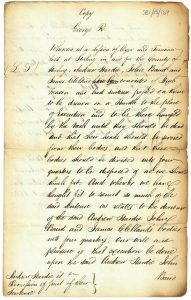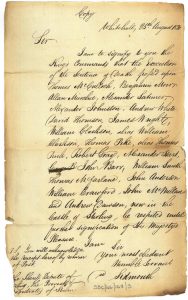Over the next few weeks, we are going to be blogging documents relating to the execution for treason of John Baird and Andrew Hardie, the two weavers who were identified as the ringleaders of the attempted insurrection that took place in Central Scotland in April 1820.
There is a small bundle of documents held at the Archives of letters and accounts relating to the arrangements made for the execution of the two men who many at the time believed died as martyrs in the cause of freedom. The Burgh Town Clerk’s Office under the Clerks Alexander Littlejohn and William Galbraith were given the task of organising the execution, which was to happen at Stirling Castle on the 8th of September. The documents, with their matter of fact discussion of the technicalities of the sentence of hanging and then decapitation, make for particularly gruesome reading.
In all, 88 men were charged with treason as a result of the uprising in April 1820, but only three paid the ultimate penalty. Special Royal Commissions of Oyer and Terminer were set up at Glasgow to hear the cases. James Wilson was tried at Glasgow on the 29th July and found guilty of one of the charges of treason against him. He was hanged and beheaded in Glasgow on 30th August. 20,000 people turned out to see the spectacle, many of these his supporters.
It is clear from the letters exchanged between the two Town Clerks of Stirling that there were elements of the Glasgow execution that the officials did not want to see replicated in Stirling. As a consequence, the communications between the two men are particularly detailed.
Text of the copy warrant of execution 25th August 1820
Copy
George R.
Whereas at a Session of Oyer and Terminer held at Stirling in and for the County of Stirling, Andrew Hardie, John Baird and James Clelland have been convicted of High Treason and had sentence passed on them to be drawn on a Hurdle to the place of Execution and to be there hanged by the neck until they should be dead and that their heads should be severed from their bodies, and that their bodies should be divided into four quarters to be disposed of as we should think fit And whereas we have thought fit to remit so much of the said sentence as relates to the dividing of the said Andrew Hardie John Baird and James Clelland’s bodies Into four quarters; our will and pleasure is that execution be done upon the said Andrew Hardie John Baird and James Clelland by their only being drawn and hanged and having their heads severally severed from their bodies according to the said sentence And that you give orders for the same accordingly And our further will and pleasure is that you do cause the heads and bodies of the said Andrew Hardie John Baird and James Clelland to be privately interred as soon as conveniently may be after such execution shall be done; And for so doing this shall be your warrant.
Given at our Court at Carlton House the Twenty Fifth day of August 1820 in the first year of our Reign.
To our Trusty and wellbeloved the Sheriff Depute of our County of Stirling, the Provost of Stirling and all others whom it may concern.
By His Majesty’s Command
Sidmouth
The sentence of hanging, drawing and quartering, the traditional punishment for treason, was later commuted to hanging and decapitation.
The first letter in the bundle along with the revised death warrant is from Lord Sidmouth to the Sheriff of Stirlingshire and relates to the decision taken by the Crown to commute the sentence of death previously passed against all 19 of the rebels arrested and held in Stirling. All of these men were later sentenced to be transported overseas to penal colonies in New South Wales and Tasmania, including the James Clelland who is mentioned in the death warrant.
Copy
Whitehall, 25th August 1820
Sir,
I am to signify to you the King’s Commands that the Execution of the Sentence of Death passed upon Thomas McCulloch, Benjamin Moir, Allan Murchie, Alexander Latimer, Alexander Johnston, Andrew White, David Thomson, James Wright, William Clackson, alias William Clarkson, Thomas Pike, alias Thomas Pink, Robert Gray, Alexander Hart, John Barr, William Smith, Thomas MacFarlane, John Anderson, William Crawford, John McMillan and Andrew Dawson, now in the Castle of Stirling, be respited until Further signification of His Majesty’s Pleasure.
I am, Sir
Your most obedient
Humble servant
Sidmouth
Over the next few days we shall be posting more of the letters written about the arrangement of the execution, each on the 200th anniversary of the day that they were written showing the unfolding story of how local officials worked to bring about a public execution in Regency Scotland.

